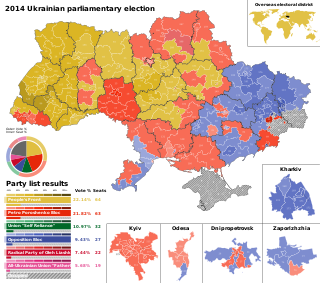
A parliamentary system, or parliamentary democracy, is a system of democratic government where the head of government derives their democratic legitimacy from their ability to command the support ("confidence") of the legislature, typically a parliament, to which they are accountable.

The Croatian Parliament or the Sabor is the unicameral legislature of Croatia. Under the terms of the Croatian Constitution, the Sabor represents the people and is vested with legislative power. The Sabor is composed of 151 members elected to a four-year term on the basis of direct, universal and equal suffrage by secret ballot. Seats are allocated according to the Croatian Parliament electoral districts: 140 members of the parliament are elected in multi-seat constituencies. An additional three seats are reserved for the diaspora and Croats in Bosnia and Herzegovina, while national minorities have eight places reserved in parliament. The Sabor is presided over by a Speaker, who is assisted by at least one deputy speaker.

The Croatian Democratic Union is a major conservative, centre-right political party in Croatia. It is one of the two major contemporary political parties in Croatia, along with the centre-left Social Democratic Party (SDP). It is currently the largest party in the Sabor with 62 seats. The HDZ governed Croatia from 1990 before the country gained independence from Yugoslavia until 2000 and, in coalition with junior partners, from 2003 to 2011, and since 2016. The HDZ's leader, Andrej Plenković, is the current Prime Minister of Croatia, having taken office following the 2016 parliamentary election.

The Democratic Party of Albania is a conservative political party in Albania. It has been the largest opposition party in the country since 2013.

The 1895 United Kingdom general election was held from 13 July to 7 August 1895. The result was a Conservative parliamentary majority of 153.

The 1886 United Kingdom general election took place from 1 to 27 July 1886, following the defeat of the Government of Ireland Bill 1886. It resulted in a major reversal of the results of the 1885 election as the Conservatives, led by Lord Salisbury, were joined in an electoral pact with the breakaway Unionist wing of the Liberals led by Lord Hartington and Joseph Chamberlain. The new Liberal Unionist party elected 77 members and gave the Conservatives their parliamentary majority, but did not join them in a formal coalition.

General elections were held in India in four phases between 20 April and 10 May 2004. Over 670 million people were eligible to vote, electing 543 members of the 14th Lok Sabha. Seven states also held assembly elections to elect state governments. They were the first elections fully carried out with electronic voting machines.

The Verkhovna Rada of Ukraine is the unicameral parliament of Ukraine.
Regular elections in Croatia are mandated by the Constitution and legislation enacted by Parliament. The presidency, Parliament, county prefects and assemblies, city and town mayors, and city and municipal councils are all elective offices. Since 1990, seven presidential elections have been held. During the same period, ten parliamentary elections were also held. In addition, there were nine nationwide local elections. Croatia has also held three elections to elect members of the European Parliament following its accession to the EU on 1 July 2013.
Frederick Walter Scott Craig was a Scottish psephologist and compiler of the standard reference books covering United Kingdom Parliamentary election results. He originally worked in public relations, compiling election results in his spare time which were published by the Scottish Unionist Party. In the late 1960s he launched his own business as a publisher of reference books, and also compiled various other statistics concerning British politics.

Elections in Ukraine are held to choose the president, Verkhovna Rada (legislature), and local governments. Referendums may be held on special occasions. Ukraine has a multi-party system, with numerous parties in which often not a single party has a chance of gaining power alone, and parties must work with each other to form coalition governments.
An independent, non-partisan politician or non-affiliated politician is a politician not affiliated with any political party or bureaucratic association. There are numerous reasons why someone may stand for office as an independent.

The Parliament of Ghana is the legislative body of the Government of Ghana.

Edmund Peter Samarakkody was a Ceylonese lawyer, trade unionist, politician and Member of Parliament.

General elections were held in Bangladesh on 7 May 1986. A total of 1,527 candidates contested the election. The result was a victory for the Jatiya Party, which won 153 of the 300 directly elected seats. Voter turnout was 61%. Bangladesh Nationalist Party, the winner of the previous elections, boycotted the election.

Parliamentary elections were held in Syria on 7 May 2012 to elect the members of the Syrian People's Council. The elections followed the approval of a new constitution in a referendum on 26 February 2012.

Snap parliamentary elections were held in Ukraine on 26 October 2014 to elect members of the Verkhovna Rada. President Petro Poroshenko had pressed for early parliamentary elections since his victory in the presidential elections in May. The July breakup of the ruling coalition gave him the right to dissolve the parliament, so on 25 August 2014 he announced the early election.
The next United Kingdom general election must be held no later than 28 January 2025. It will determine the composition of the House of Commons, which determines the next Government of the United Kingdom. Significant constituency boundary changes will be in effect, the first such changes since before the 2010 general election. In addition, this will be the first UK general election where physical forms of voter identification will be a legal requirement to vote in Great Britain. The prime minister, Rishi Sunak, has said it is his "working assumption" that the next general election will be held in 2024.
















